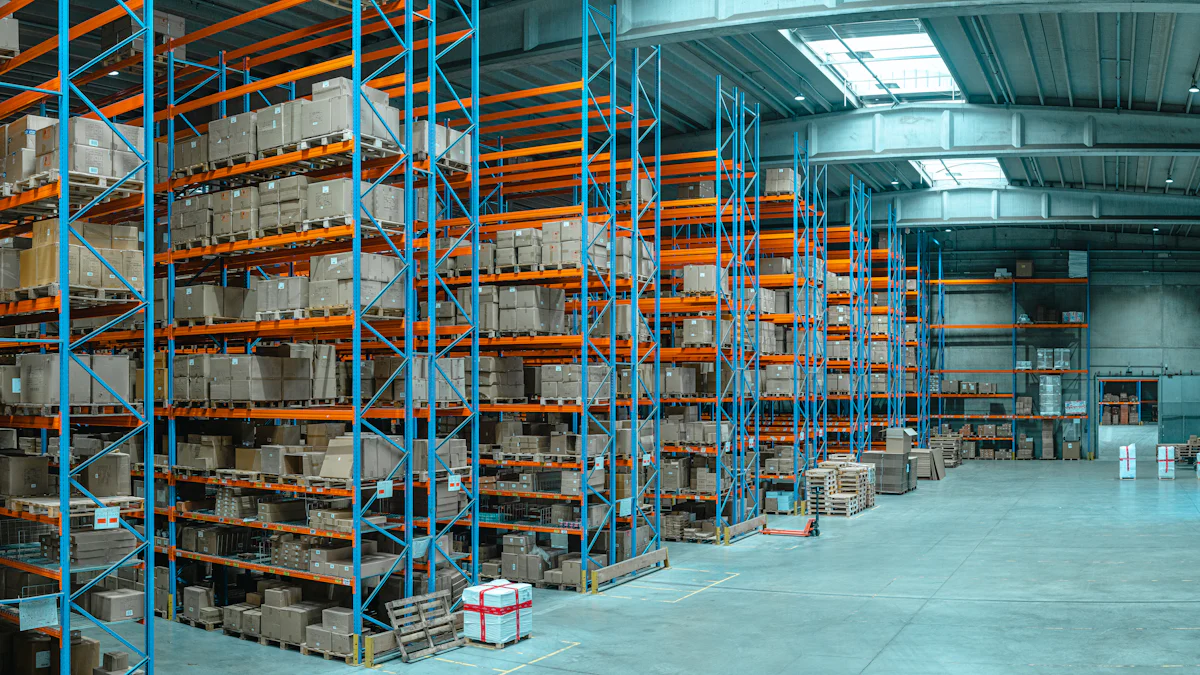Practical Lean Supply Chain Management: How JUSDA Supports Efficient Operations in the 3C Industry

Lean Supply Chain Management focuses on minimizing waste and optimizing processes to enhance efficiency. JUSDA, a leader in supply chain solutions, plays a pivotal role in the 3C (Computer, Communication, and Consumer Electronics) industry. Efficient operations in the 3C sector are crucial due to the high demand for rapid production and delivery. JUSDA's innovative approaches, such as the JusLink Smart Supply Chain platform, leverage IoT, cloud computing, and big data analytics to streamline operations and ensure seamless connectivity across the supply chain.
Understanding Lean Supply Chain Management
Principles of Lean Supply Chain
Reducing Waste
Lean Supply Chain Management focuses on eliminating waste across all supply chain processes. Waste includes any activity that does not add value to the customer. By identifying and removing these non-value-added activities, organizations can streamline operations and reduce costs. This principle ensures that resources are utilized efficiently, leading to a more responsive and agile supply chain.
Continuous Improvement
Continuous improvement, or Kaizen, is a core principle of Lean Supply Chain Management. It involves constantly seeking ways to enhance processes and eliminate inefficiencies. Organizations implement small, incremental changes that collectively lead to significant improvements over time. This approach fosters a culture of innovation and adaptability, enabling supply chains to remain competitive in a dynamic market environment.
Just-In-Time (JIT) Production
Just-In-Time (JIT) production aims to produce and deliver products exactly when needed, minimizing inventory levels and reducing storage costs. JIT requires precise coordination between suppliers, manufacturers, and customers to ensure timely delivery of materials and products. This principle enhances supply chain efficiency by reducing lead times and improving responsiveness to customer demands.
Benefits of Lean Supply Chain Management
Cost Reduction
Lean Supply Chain Management significantly reduces operational costs by eliminating waste and optimizing processes. Organizations can lower production costs, reduce inventory holding costs, and minimize transportation expenses. These cost savings contribute to improved financial performance and increased profitability.
Improved Quality
Implementing Lean principles leads to higher quality products and services. By focusing on continuous improvement and waste reduction, organizations can identify and address defects and inefficiencies. This results in fewer errors, higher customer satisfaction, and a stronger competitive advantage in the market.
Faster Delivery Times
Lean Supply Chain Management enhances the speed and reliability of product delivery. By streamlining processes and implementing JIT production, organizations can reduce lead times and respond more quickly to customer orders. Faster delivery times improve customer satisfaction and help businesses meet market demands more effectively.
JUSDA's Role in the 3C Industry

Overview of JUSDA
Company Background
JUSDA, a prominent player in the supply chain industry, has nearly 20 years of experience in Lean Supply Chain Management. The company stands out for its unparalleled expertise and innovative solutions. As the only authorized supply chain management platform service company of Foxconn Technology Group, JUSDA has solidified its position as a leader in end-to-end supply chain integration. The company's commitment to excellence is evident through its strong networks with cross-border transfer centers and international logistic partnerships.
Core Services
JUSDA offers a wide range of core services tailored to meet the needs of the 3C industry. These services include road freight, air freight, ocean freight, rail freight, and warehousing. JUSDA also provides the JusTrade import and export service platform, which simplifies international trade processes. The company's K2L (Kitting to Line) services ensure efficient assembly line operations by delivering pre-assembled kits directly to the production line. JUSDA's comprehensive logistics solutions enable seamless connectivity and information sharing across the entire supply chain ecosystem.
JUSDA's Lean Supply Chain Solutions
Technology Integration
JUSDA leverages cutting-edge technology to enhance Lean Supply Chain Management. The JusLink Smart Supply Chain platform harnesses the power of IoT, cloud computing, and big data analytics. This platform shatters traditional silos, enabling seamless connectivity and information sharing throughout the supply chain. By integrating AI and digital supply chain development trends, JUSDA provides vertical integration solutions from component manufacturing to end-consumer segments (C2M2C). These technology-driven solutions ensure real-time collaboration, data analysis, and efficient resource utilization.

SMART JusLink
Supply Chain Management Solution
Process Optimization
JUSDA focuses on process optimization to improve Lean Supply Chain Management. The company employs continuous improvement methodologies, such as Kaizen, to identify and eliminate inefficiencies. JUSDA's end-to-end industrial and distribution chain expertise allows for streamlined operations from raw material procurement to final product delivery. By optimizing processes, JUSDA reduces lead times, minimizes inventory levels, and enhances overall supply chain responsiveness. This approach fosters a culture of innovation and adaptability, ensuring that supply chains remain competitive in a dynamic market environment.
Supplier Collaboration
JUSDA emphasizes supplier collaboration as a key component of Lean Supply Chain Management. The company works closely with suppliers to ensure timely delivery of materials and products. JUSDA's integrated logistics solutions include meticulous material management and EDI system integration. This collaboration enhances supply chain efficiency by reducing lead times and improving responsiveness to customer demands. JUSDA's global network, with 155 service points worldwide and over 2.5 million square meters of warehousing and distribution area, supports efficient global operations and quick response to market demands.
Case Studies and Real-World Examples

Successful Implementations
Case Study 1: Company A
Company A, a leading manufacturer in the 3C industry, faced challenges with inventory management and lead times. JUSDA implemented its JusLink Smart Supply Chain platform to address these issues. The integration of IoT and big data analytics provided real-time visibility into inventory levels and demand forecasts. This technology-driven approach enabled Company A to reduce inventory holding costs by 20% and improve lead times by 30%. The seamless connectivity across the supply chain enhanced operational efficiency and responsiveness to market demands.
Case Study 2: Company B
Company B, a global consumer electronics brand, struggled with inefficiencies in its logistics operations. JUSDA introduced tailored solutions, including the K2L (Kitting to Line) service and advanced e-commerce storage systems. These solutions streamlined the assembly line process and optimized warehousing operations. As a result, Company B experienced a 25% increase in production efficiency and a 15% reduction in logistics costs. The collaboration with JUSDA established Company B as a leader in lean supply chain management.
Lessons Learned
Key Takeaways
Real-Time Visibility: Implementing advanced technologies like IoT and big data analytics enhances supply chain visibility. This leads to better decision-making and more efficient operations.
Process Optimization: Continuous improvement methodologies, such as Kaizen, play a crucial role in identifying and eliminating inefficiencies. This fosters a culture of innovation and adaptability.
Supplier Collaboration: Close collaboration with suppliers ensures timely delivery of materials and products. This reduces lead times and improves overall supply chain responsiveness.
Best Practices
Leverage Technology: Utilize platforms like JusLink to integrate IoT, cloud computing, and big data analytics. This will enhance real-time collaboration and data analysis.
Focus on End-to-End Solutions: Adopt end-to-end supply chain solutions, from raw material procurement to final product delivery. This ensures streamlined operations and improved efficiency.
Implement Continuous Improvement: Regularly assess and optimize processes through continuous improvement methodologies. This will help maintain competitiveness in a dynamic market environment.
Practical Tips for Implementing Lean Supply Chain Management
Assessing Current Processes
Identifying Bottlenecks
Identifying bottlenecks remains a crucial step in Lean Supply Chain Management. Bottlenecks slow down the entire supply chain, causing delays and inefficiencies. Supply chain professionals often spend nearly 14 hours per week manually tracking data. This manual tracking process can lead to significant bottlenecks. To identify these issues, organizations should map out their entire supply chain process. This mapping helps pinpoint areas where delays occur. Once identified, these bottlenecks can be addressed through targeted interventions.
Analyzing Data
Analyzing data plays a vital role in Lean Supply Chain Management. Accurate data analysis provides insights into supply chain performance. Over three-fourths of supply chain professionals do not currently have a predictive view of supply and demand. This lack of visibility hampers decision-making processes. Implementing advanced data analytics tools can help organizations gain real-time insights. These tools analyze historical data and predict future trends. By leveraging data analytics, companies can make informed decisions that enhance supply chain efficiency.
Implementing Lean Principles
Employee Training
Employee training is essential for successful Lean Supply Chain Management. Well-trained employees understand lean principles and can apply them effectively. Training programs should focus on key lean concepts such as waste reduction, continuous improvement, and Just-In-Time production. Regular workshops and hands-on training sessions can reinforce these concepts. Employees who grasp lean principles contribute to a more efficient and agile supply chain.
Continuous Monitoring
Continuous monitoring ensures the sustainability of Lean Supply Chain Management practices. Organizations must regularly assess their processes to identify areas for improvement. Continuous monitoring involves tracking key performance indicators (KPIs) such as lead times, inventory levels, and delivery accuracy. Advanced technologies like IoT and big data analytics facilitate real-time monitoring. These technologies provide valuable insights that help organizations maintain optimal supply chain performance. Regular audits and reviews also play a crucial role in continuous monitoring.
Future Trends in Lean Supply Chain Management
Technological Advancements
AI and Machine Learning
Artificial Intelligence (AI) and Machine Learning (ML) will revolutionize supply chain management. AI algorithms can analyze vast amounts of data to predict demand patterns. This predictive capability allows for better inventory management. Machine Learning models can optimize routing and logistics operations. These technologies enhance decision-making processes, leading to more efficient supply chains.
IoT and Automation
The Internet of Things (IoT) and automation will continue to transform supply chains. IoT devices provide real-time visibility into production and inventory levels. This transparency improves asset utilization and return on investment (ROI). Automated systems streamline repetitive tasks, reducing human error. Robotics and automated guided vehicles (AGVs) enhance operational efficiency. These advancements support a more agile and responsive supply chain.
Evolving Industry Standards
Sustainability
Sustainability has become a critical focus in supply chain management. Companies aim to reduce their carbon footprint and promote eco-friendly practices. Sustainable supply chains involve using renewable energy sources. Efficient waste management and recycling programs also play a role. Organizations adopt green logistics strategies to minimize environmental impact. These efforts align with global sustainability goals and enhance brand reputation.
Globalization
Globalization continues to shape supply chain dynamics. Companies expand their operations across borders to tap into new markets. This expansion requires robust supply chain strategies to manage complexities. Cross-border logistics and international trade regulations pose challenges. Effective global supply chains leverage technology for seamless integration. Strategic partnerships and collaborations ensure smooth operations. Globalization drives innovation and competitiveness in the supply chain industry.
Lean supply chain management remains essential for businesses aiming to enhance efficiency and operational performance. JUSDA's nearly 20 years of expertise in this field, combined with innovative solutions, position the company as a pivotal partner in the 3C industry. JUSDA's contributions include end-to-end supply chain integration, advanced technology use, and supplier collaboration. Future trends such as AI, IoT, and sustainability will continue to shape the landscape. Continuous improvement and adaptation will ensure that supply chains remain competitive and responsive to market demands.
See Also
Optimizing Productivity: JUSDA's Full Supply Chain Transparency
The Transformation of Supply Chain Sustainability by JUSDA
The Superiority of JUSDA's Supply Chain Solutions in the Industry
Revealing JUSDA's Proficiency in Inventory Optimization
The Definitive Manual on JUSDA's Maintenance of Supply Chain Quality
